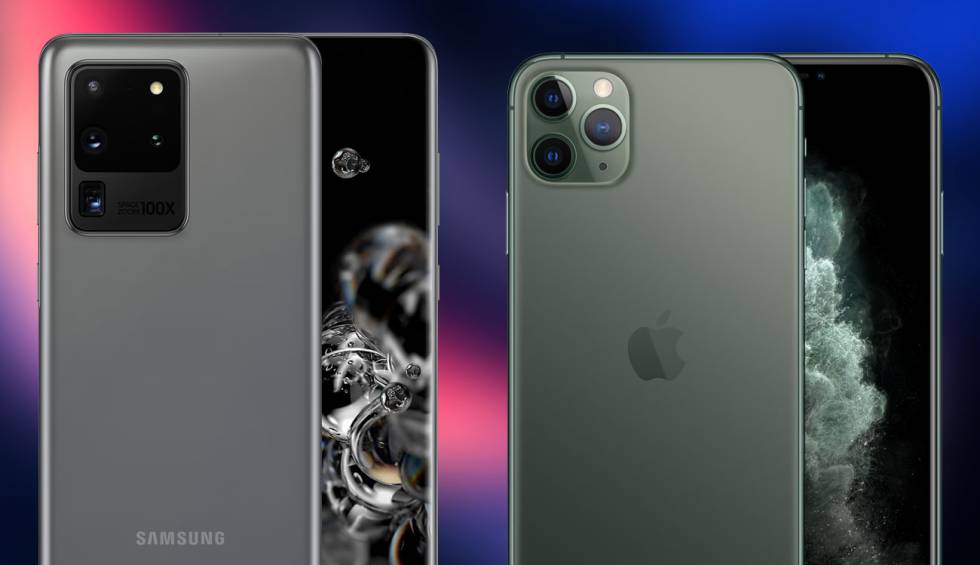
If you'd asked us a few months ago to pick one smartphone which had the absolute best cameras, the iPhone 11 Pro would have been an easy recommendation. It might not have a lot of the fancy shooting modes that its Android counterparts do, but when it comes to pure image and video quality, it's definitely been the most consistent so far. Last year, we pitted it against Samsung's finest — the Galaxy Note 10+ — and it managed to win the majority of our tests.
This year, Samsung is going all-out on its camera technology with the new Galaxy S20 series. We've already seen some of the great things that the cameras of the Galaxy S20+ are capable of in our full review of the smartphone, but does this phone capture better images and videos than the iPhone 11 Pro? Of course, Apple doesn't release new flagships twice a year like Samsung, so the iPhone 11 Pro is somewhat older. It's still Apple's flagship though, and has not fallen in price since its launch.
Today, we'll be comparing the Galaxy S20+ to the iPhone 11 Pro in our usual series of tests. The aim is to see which phone manages to deliver the most consistent camera performance with photos as well as videos. Is Samsung's new camera tech better than Apple's finest offering? It's time to find out.
Camera specifications and features
Before we dive in, here's a quick comparison of some of the main specifications of the cameras of both smartphones. Both have the same number of front and rear cameras, except that the Galaxy S20+ has an additional depth sensor at the back. Samsung has revamped its camera sensors from the previous generation, with some notable changes. The primary sensor still has a 12-megapixel resolution but it lacks the dual-aperture feature which had been a staple of Samsung flagships for a couple of generations. The wide-angle sensor also has a lower resolution now, but perhaps the most interesting change is the new 64-megapixel telephoto camera.
Samsung has coined the term ‘Space Zoom' to describe the 3x “hybrid optical zoom” and up to 30x “super resolution zoom" that the Galaxy S20+ can achieve. We'll go into more details about this in the respective section ahead, but on paper, the Galaxy S20+ already has a far superior zoom capability that the iPhone 11 Pro. Other areas where Samsung pulls ahead are its ability to record 8K video, super slow-motion video at 960fps, and the many shooting modes on offer.
Apple has taken a simpler approach with the iPhone 11 Pro, offering the basic shooting modes which we've see on previous models too, but with the addition of an always-on Night mode. With iOS 13.2, Apple also introduced Deep Fusion on the iPhone 11 series, which uses the custom-designed A13 Bionic processor's neural engine to enhance photos, similar to what Google's been doing with its Pixel phones.
With this out of the way, it's time to head to the tests and see which phone does a better job.
Samsung Galaxy S20+ vs iPhone 11 Pro landscape test
In our first test, we have a landscape shot of a nearby building. Both smartphones capture excellent details on the building and the trees in the foreground. However, we prefer the shot taken with the iPhone 11 Pro, simply because the exposure is more balanced and colours are more natural. The shot from the Galaxy S20+ is brighter but the texture on the building surface is blown out and the sky is a little unnaturally blue. It looks striking, no doubt, but it's not the best.

In our second shot, we got nearly identical-looking images from both phones. Exposure was well balanced and there was plenty of details in the objects, both near and far. Samsung bumps up the colours very slightly and the shadows are also lifted, which makes for a more vivid result compared to what the the iPhone 11 Pro delivers. However as a result, blacks are crushed a little, displaying less details than the 11 Pro's output.

In low light, the Samsung Galaxy S20+ was unable to reproduce very good colours, however switching to Night mode improved things dramatically. Colours were noticeably better and we could see more detail in objects in the shadows. However, textures on smaller objects such as the leaves looked a bit worse. The iPhone 11 Pro automatically activates Night mode when it detects low light, and the results are fantastic. Comparing its output with the Night mode shot taken with the Galaxy S20+, the 11 Pro managed more realistic colours on leaves and trees, and even finer textures were better defined.
For landscapes, we'd pick the iPhone 11 Pro as the overall winner.
Samsung Galaxy S20+ vs iPhone 11 Pro close-up test
Switching to much smaller objects and shooting under harsh sunlight, we see the iPhone 11 Pro balanced exposures very well. Not only that, it even managed to retain the right shade of red on the flowers and delivered a pleasing depth effect for the background. The Galaxy S20+ struggled with exposure a bit, and didn't manage to meter white balance very well. As a result, the flowers took on an orange hue from the sunlight, which wasn't accurate. It did deliver a slightly stronger depth effect though, compared to the 11 Pro.

Our second subject was also photographed at around the same time of day, but under the cover of trees so the light was less harsh. The iPhone 11 Pro once again produced a more neutral colour tone and a more accurate rendition of the pink shade of the flowers. If we look closer, it even managed slightly better textures than the Galaxy S20+. Samsung's photo wasn't far behind, with a slightly warmer colour tone.

Comments
Post a Comment